Civilization: Beyond Earth E3 interview: diplomacy, quests, and putting the pieces together
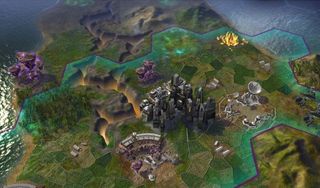
E3 isn't the easiest place to demo a sprawling, intricate strategy game like Civilization: Beyond Earth , but it is a great place to give the talented developers at Firaxis a chance to talk about the sci-fi future of Civ. While I played a demo build of Beyond Earth's early game, landing on an alien planet and stumbling around in deadly miasma, I talked to lead producer Lena Brenk about what's changed since our big reveal , how XCOM has influenced Beyond Earth, and Sid Meier's 10 Commandments of Civ.
PC Gamer: For starters, can you tell me a little bit about your work as a lead producer?
Lena Brenk : Lead producer is, god, it's a very varied job. Basically I'm there to give the team everything they need to bring this game to a successful launch. That can mean getting food, checking the schedule...
PCG : You do more than getting food!
Brenk : No, I do get food if necessary. I want my team to be happy! It means checking the schedule, seeing that everything lines up so we get everything done on time, and in budget. It's a pretty varied role. I love it.
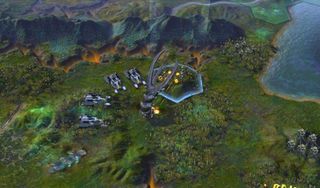
PCG : In the reveal we talked a lot about cultures, influence from Alpha Centauri and classic Civ, Civ Revolution, so from that as a baseline, what have you mostly been working on in the past two months since the reveal? What's new?
Brenk : Well, everything. We're in the stage where we're balancing a lot, where we're trying to fine-tune which systems are coming online when. There are a lot of new systems, the usual Civ systems, and how they play with each other. You always will have a city and expansions and new cities. Although the system changed a bit in how you get them, it's still Civ at core. Then going from that to the quest system, how does that interact, and how can we use that to nudge players in certain directions? Help them understand new systems, but also provide narrative for this game.
The biggest gaming news, reviews and hardware deals
Keep up to date with the most important stories and the best deals, as picked by the PC Gamer team.
A lot of writing has been going on to provide backstory. We can't rely on the history of mankind anymore.
PCG : You've got to make it up!
Brenk : We needed to make a new world, a new future for mankind. A lot of artwork has obviously gone in. But a lot of it right now is getting the systems to work together well. Early game is a lot about survival, you come to this planet and don't exactly know what to expect. Then you figure out how this planet works and how it ticks.
At some point you get more comfortable: you're like, these are the aliens, I know how to deal with them, I know how to deal with miasma now.
PCG : I almost died to the miasma a minute ago.
Brenk : Lesson learned! And you can research things that help you survive in miasma. The aliens actually heal from it, so if you study them well enough, you'll get that ability too. Later on, the other expeditions join you on this planet, there's a staggered start. They say hi when they touch down. In the mid-game, it becomes more about diplomacy, so now it's about...say I'm the Purity player. I picked Purity as my affinity. I want to remain as human as possible and change the planet to fit me. I don't want to change. I'm human. Human is awesome!
But your direct neighbor may be going Harmony. He wants to be like an indigenous life form to this planet, to figure out how to best make use of the natural resources. So he's starting to adapt his genes to this planet, and now you're starting to tear up this planet and make it more like Earth. So there's a conflict of interest there in how you see the future of mankind unfold. So it'll become more about how we develop in the future and the different visions for the future and who will ultimately get their vision.
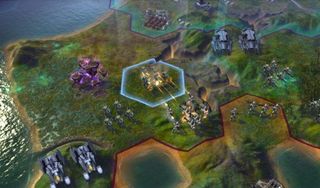
PCG : Are those diplomacy traits adapted versions of, say, religion in classic Civ, where Purity is Christianity and Harmony is Buddhism, and they don't get along well at all?
Brenk : You could say there's an analogy to ideologies in Civ 5: Brave New World . If you went Order and somebody else went Freedom, they're kind of suspicious of you. It does have some impact when you start terraforming to be like Earth in this game, you're removing all the miasma as a Purity player, the Harmony player has been so adaptive to the whole world that he can use miasma, so he's spreading miasma wherever he can because he heals in it now. So it's not just a clash of ideas, it's a clash of your actions on the map.
PCG : Do you have any stories from the process of doing balance changes where one day a system threw the whole game out of whack?
Brenk : There definitely were, but I can't think of the dramatic ones right now. The alien balancing has been ongoing, and the unit upgrade balancing too. So at one point the soldiers with their first upgrade were hilariously overpowered. I think it was meant to be a 10% increase in strength and through some mathematical increase it was a 300 percent increase, so you suddenly had this unit that could just flatten anything. You could win Domination victory with that one unit. If you got there first, you won the game, basically, with just a guy in a space suit.
PCG : That's part of the development process that people don't get much insight into--tuning these systems, making them work together. As you get closer to finishing, how do you start connecting separate systems like, say, the research and quest systems?
Brenk : If you look at the quest systems, balancing the rewards, we don't want the player to feel obligated to finish every quest. They should be able to pick and choose which quests they want to pursue. Some you kind of have to make a decision, it just pops up and you make a decision, it's quick. Others are very long quest chains. Some people play very narratively and enjoy that, but for others it might not fit what you're doing right now. So getting the rewards to a point where it's nice to have, but not absolutely necessary to go for the quests, is something that will probably be ongoing work until we ship.
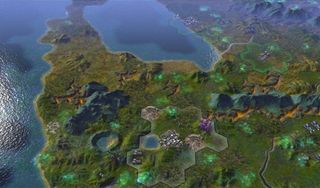
PCG : So the quest I saw in the demo, I had completed the requirements for the quest, and it popped up with a binary choice: Do you want to tame aliens or kill them? Are there quests where it pops up with some kind of imperative, like, "Do this thing within a certain number of turns?"
Brenk : There are quests that just show up in the quest log and you get a notification that there is a quest, but it's the start of a chain. Maybe you need to get an explorer to an artifact and excavate it. From there the story unfolds based on what you find. We're not final yet on how much to communicate to the player that a new quest has come up. You don't want to spam a player with pop ups. If you don't care about the quest, it would be very interrupting if everything had a pop-up.
PCG : I feel like a lot of Civ players just want their sandbox.
Brenk : Right. That's definitely one of the points that will be subject to balance. How much communication is necessary, how much is too much. We're doing play lunches on Wednesdays with the team, and luckily we have a bunch of different play styles on the team. Our warmongers, builders, micromanagers. We all play the current build on that day and everyone gets together afterwards and discusses what they found and how it felt to them. We know each other now, so you can tell that certain features really appeal to one type of player. Balancing that out has always been a strength of the Civ series. It's really important that it appeals to very different players.
PCG : Are the people who love war or love building always pushing to get more of that element in the game?
Brenk : I guess sometimes. You push for the things you like. I'm a builder player, so when I get excited about certain features, I will make sure I'm heard. It's ultimately one of the not-so-easy tasks for the game designers to get all this input and then do what's right, not do what people are asking for. Do what's right for the game and balance it. David and Will have actually been really good at that. It probably helps that there are two of them, because they already have two views.
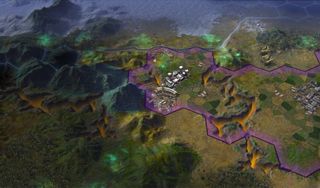
PCG : Has there been any influence from XCOM, which has been such a huge success?
Brenk : Narratively it plays in a very different universe, but at Firaxis, we like to think of ourselves as Firaxis, not, "They worked on that game, we work on this game." There's a lot of crossover. I know the designers have weekly meetings with all the other designers. Jake, for example, and Sid, and David and Will and Ed Beach from Civ 5. They discuss questions and challenges. So in that sense, there's always influence from every game.
But narratively, it's very different. I think Jake did a very good job approaching XCOM, this beloved old franchise, and doing a modern version of it. It's not just a sequel. It's today's XCOM. And with Civ, this whole question of "How do we take Civilization into the future? What's Civilization in sci-fi?" Having that approach, let's not be overly concerned about exactly what everybody expects this to be. Let's just make the best Civilization in sci-fi we can make. We know Civilization. We know what makes Civilziation a Civilization game. I know David and Will had a discussion with Sid, asking what's the bones of Civilization? If it would be missing this feature, at which point would you not call it Civilization anymore?
PCG : So did Sid Meier hand down the 10 commandments of Civ?
Brenk : Oh yeah, he's involved!
PCG : Or the 50 commandments?
Brenk : Oh god, there might be a lot of them! I'm not in the design meetings, so not all the wisdom Will and Dave get from Sid filters down to me. But the terrain, for example, is the star of the game. You may go into a game saying today I want to become a robot. I'm going for supremacy. That will be cool. And then you land on the planet and the resources you find around you and the aliens that are near to you, just doesn't line up for supremacy. And you end up going Harmony. So it's a lot about reaching to what's around you.

Wes has been covering games and hardware for more than 10 years, first at tech sites like The Wirecutter and Tested before joining the PC Gamer team in 2014. Wes plays a little bit of everything, but he'll always jump at the chance to cover emulation and Japanese games.
When he's not obsessively optimizing and re-optimizing a tangle of conveyor belts in Satisfactory (it's really becoming a problem), he's probably playing a 20-year-old Final Fantasy or some opaque ASCII roguelike. With a focus on writing and editing features, he seeks out personal stories and in-depth histories from the corners of PC gaming and its niche communities. 50% pizza by volume (deep dish, to be specific).

If you love big trucks, establishing trade routes, and the phrase 'post-apocalyptic survival business simulator' then I've got just the strategy RPG for you

Blizzard veteran David Kim's strategy comeback with Battle Aces is 'very personal:' 'I just can't accept... the end-all peak of RTS is StarCraft 2 and nothing can ever be better'
Most Popular







